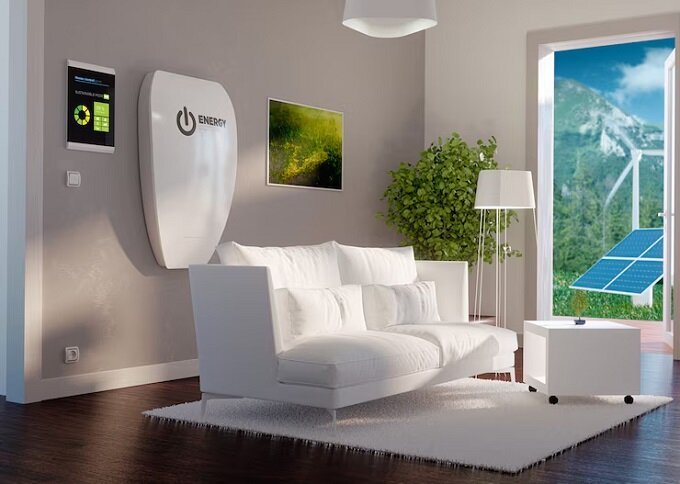Are you tired of sky-high energy bills that seem to keep climbing? Well, it’s time to fight back! With the help of smart home technology, you can significantly reduce your energy costs and gain more control over your home’s energy efficiency. From smart thermostats that optimize your heating and cooling to smart lighting that adjusts to your needs, the benefits of a smart home go beyond convenience – they can save you money.
In this article, we will explore the various ways smart home devices and systems can lower your energy bills, providing a comprehensive guide to help you make informed decisions about adopting smart home technology.
So, get ready to save energy and money while also contributing to a more sustainable future!
How Smart Home Technology Can Reduce Energy Bills
Smart Thermostats
Smart thermostats are like having a personal assistant for your home’s heating and cooling system. These devices can automatically adjust the temperature based on your preferences, and some can even learn your habits over time. For example, let’s say you like to keep the temperature cooler at night while you sleep. A smart thermostat can detect this pattern and automatically adjust the temperature for you, ensuring energy isn’t wasted when you’re snug under the covers.
One of the key benefits of smart thermostats is their ability to be controlled remotely. Imagine being able to turn down the heat when you’re away on vacation, or adjusting the temperature as you’re heading home, ensuring a comfortable environment awaits you. This level of control not only improves your comfort but also saves energy and money. In fact, according to Energy Star, a smart thermostat can save you up to $180 per year on your energy bills!
Smart Lighting
Smart lighting systems are another powerful tool in your energy-saving arsenal. These systems go beyond simply turning lights on and off. They can automatically adjust brightness based on the amount of natural light in a room and even turn lights off when no one is present, ensuring energy isn’t wasted on illuminating empty spaces.
Let’s say you have a habit of rushing out of the house in the morning and often forget to turn off the lights. With smart lighting, you can set schedules or use remote control to turn off lights from your phone, no matter where you are. You can also create scenes or moods with different lighting settings, ensuring you only use the amount of light you need.
Some popular smart lighting products include:
- Philips Hue: This system offers a wide range of bulbs and fixtures, allowing you to control and automate your lighting. With features like dimming and color-changing capabilities, you can set the perfect mood while also saving energy.
- Lifx: With a focus on simplicity, Lifx bulbs connect directly to your Wi-Fi, offering easy control and a range of colors to choose from.
- Lutron Caséta: This system includes switches and dimmers that can be controlled remotely, allowing you to adjust lighting levels and create schedules to manage energy use.
Smart Plugs and Power Strips
Smart plugs and power strips are an easy and affordable way to manage energy usage for a variety of devices and appliances. Simply plug your device into a smart plug, and you’ll instantly gain the ability to monitor and control its energy usage. For example, you can use a smart plug to turn off your TV and prevent it from using standby power when not in use.
Smart power strips take this a step further by allowing you to control and monitor multiple devices simultaneously. This is especially useful for home entertainment systems, which often include several components that can draw power even when not in use. With a smart power strip, you can ensure that all devices are truly powered off when not in use, reducing energy waste.
Smart Appliances
Smart appliances, such as refrigerators, washing machines, and dishwashers, are designed with energy efficiency in mind. These appliances can be controlled and monitored remotely, allowing you to schedule their use and take advantage of off-peak energy rates. For example, you can set your dishwasher to run during the night when energy demand is lower, helping to reduce your carbon footprint and energy costs.
Let’s take a smart refrigerator as an example. This appliance can notify you when the door is left open, preventing cold air from escaping and wasting energy. It can also adjust its temperature based on the weather, using less energy when it’s cooler outside. Many smart appliances also come with an Energy Star certification, ensuring they meet strict energy efficiency standards.
Smart Home Energy Management Systems
A smart home energy management system brings all your energy-related devices and data together, providing a comprehensive view of your home’s energy usage. These systems offer features like real-time monitoring, allowing you to see how much energy each device or appliance is using. You can also receive detailed energy usage reports, helping you identify areas where you can cut back.
For example, let’s say you notice that your home’s energy usage spikes during the summer months due to increased air conditioning use. With this insight, you could consider investing in a smart thermostat to better manage your cooling system, or even look into renewable energy sources like solar panels to offset your energy costs.
Smart Home Security Systems
While smart home security systems are primarily designed to keep your home safe, they can also play a role in reducing energy costs. These systems often include features like motion sensors and remote access, allowing you to monitor and control your home’s security from anywhere.
For instance, if you forget to turn off the lights or adjust the thermostat before leaving for a trip, you can simply use your smartphone to do so, ensuring energy isn’t wasted while you’re away. Additionally, some smart security systems offer smart leak detection, which can prevent water damage and the associated energy costs of repairing and replacing affected areas.
Smart Sprinkler Systems

Smart sprinkler systems take the guesswork out of watering your lawn, helping you reduce water usage and lower your energy bills. These systems use weather data and soil moisture sensors to automatically adjust watering schedules, ensuring your lawn gets just the right amount of water.
For example, if rain is in the forecast, the system will skip watering for the day, saving you money and conserving water. You can also receive water usage reports, giving you insights into how much water your lawn needs and helping you make adjustments to save even more.
Smart Windows and Shades
Smart windows and shades are an innovative way to control heat gain and loss in your home, improving insulation and reducing energy consumption. These windows can automatically adjust their tint or opacity based on the temperature and sunlight, ensuring your home stays comfortable without relying heavily on heating or cooling systems.
For instance, on a hot, sunny day, smart windows can become tinted, reducing the amount of heat entering your home and lessening the need for air conditioning. Similarly, smart shades can be programmed to lower or raise at certain times of the day, providing an extra layer of insulation and keeping your home’s temperature stable.
Smart Home Sensors and Monitors
Smart home sensors and monitors provide valuable insights into your home environment, including temperature, humidity, and air quality. By placing these sensors in different areas of your home, you can identify problem areas and make adjustments to improve energy efficiency.
For example, if a sensor detects high humidity levels in your basement, you might consider investing in a dehumidifier to prevent mold and improve air quality. Or, if you notice that a particular room struggles to stay cool in the summer, you could look into adding a smart fan to improve air circulation and reduce your reliance on air conditioning.
Integration with Renewable Energy Sources
One of the most exciting aspects of smart home technology is its ability to integrate with renewable energy sources, such as solar panels. By combining smart home systems with renewable energy, you can take control of your energy usage and significantly reduce your reliance on the traditional power grid.
For instance, a smart home energy management system can optimize the use of solar energy by directing it to where it’s needed most. It can also store excess energy in batteries for use during peak demand periods, helping to stabilize your energy costs and reduce your carbon footprint.
Homeowners and businesses can use Utility Bidder to identify the most cost-effective energy plans, ensuring seamless compatibility between their renewable systems and grid energy sources.
Conclusion
Smart home technology offers a wealth of benefits when it comes to reducing energy bills and promoting sustainability. By adopting even a few of the solutions outlined above, you can gain more control over your home’s energy usage and make a positive impact on both the environment and your wallet.
So, why wait? Start exploring the world of smart home devices and systems, and take the first step towards a more energy-efficient home. With the right combination of smart technology, you can save money, conserve energy, and enjoy the convenience and peace of mind that comes with a smarter, more efficient home.
Key Takeaways
- Smart home technology offers a range of benefits, including the ability to reduce energy bills and promote sustainability.
- Smart devices can provide remote control, scheduling, and energy monitoring, helping you save energy and money.
- By adopting smart home solutions, you can gain insights into your energy usage and make informed decisions to optimize your energy efficiency.
- Integrating smart home technology with renewable energy sources can lead to even greater energy and cost savings.
Remember, every journey begins with a single step, and setting up a smart home is a rewarding way to begin your journey toward a greener and more cost-effective future.



